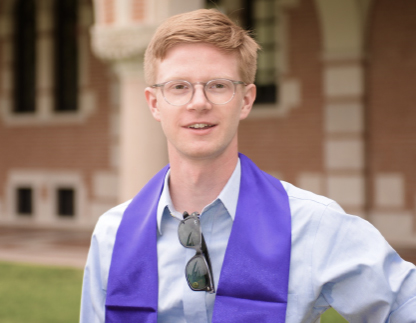Even if something fails in science, the process of doing good research still leads to new and exciting ideas in all sorts of areas.”
John Ahrens
PhD Candidate in Chemical and Biological Engineering

John Ahrens is a PhD candidate in the Department of Chemical and Biological Engineering in the McCormick School of Engineering. He develops programmable multiprotein structures by using DNA as a molecular glue, enabling scientists to engineer protein systems with greater precision. John is a recipient of the Ryan Fellowship.
How would you describe your research and/or work to a non-academic audience?
I develop new ways to modify and piece together different proteins. Two strands of DNA can be programmed to bind specifically to one another based on their sequences, which allows DNA to be used as a precise molecular glue at the nanoscale. Proteins, on the other hand, have highly complex and often unpredictable binding interactions.
By functionalizing a given set of proteins with specific DNA sequences, I can program how they will bind to one another, turning them effectively into Legos. These will be used to form new programmable multiprotein structures that will bring us closer to replicating the highly complex protein systems found in nature.
What have been some of the most memorable twists and turns of your career?
I actually started grad school with the goal of designing a new therapeutic for cancer using proteins and DNA. Unfortunately the project didn't work out, but I learned so much about the challenges of protein-DNA conjugation that my current project was formed out of it. I've learned first-hand that even if something fails in science, the process of doing good research still leads to new and exciting ideas in all sorts of areas that one may have never expected from the outset.
Tell us what inspired your research and/or work.
I did some work as an undergraduate on engineering proteins. Upon joining the Mirkin Lab, I learned how DNA could be harnessed for its highly predictable properties, and I was inspired to help bring this capability to the world of proteins.
What is the biggest potential impact or implication of your work?
Multi-protein complexes are the key to many hugely important processes in biology, from allowing cells to take in food to fighting off infections. My research helps build the groundwork for scientists to design and build new multi-protein complexes in the lab that can either improve upon what nature already does or to bring about new applications entirely. The more tools we have to engineer at the nanoscale, the more sophisticated we can make our smallest devices.
Why Northwestern?
There are great research opportunities here, the campus is really nice and close to Chicago, and most importantly I really like the people I've met.
How do you unwind after a long day?
Rock climbing, reading, biking, watching movies, listening to music, or playing video games with friends.
What books are on your bedside table?
Consider the Lobster (David Foster Wallace)
Critique of Pure Reason (Immanuel Kant)
What advice would you give your younger self or someone considering a similar path?
Don't feel like you need to cure cancer right off the bat as a grad student. Most research is incremental, which still feels very rewarding to work on.
Publish Date: November 18, 2025